SBM4203 Management Information Systems: Reflective Report on Learning
VerifiedAdded on 2023/03/21
|7
|1458
|64
Report
AI Summary
This report provides a reflective analysis of management information systems (MIS) and their practical applications across various sectors, including manufacturing, medical, and education. It delves into the advantages and disadvantages of Enterprise Resource Planning (ERP) systems, using SAP R/3 as a case study to evaluate its suitability for different business sizes. The report also explores the role of Artificial Intelligence (AI) in enhancing knowledge management and decision-making processes. Furthermore, it addresses the ethical implications of employee monitoring, balancing organizational security needs with employee privacy rights, and includes real-world examples of misconduct and strategies for preventing future incidents. The reflection concludes with a discussion on the importance of strong security measures and ethical policies in safeguarding organizational and employee interests.
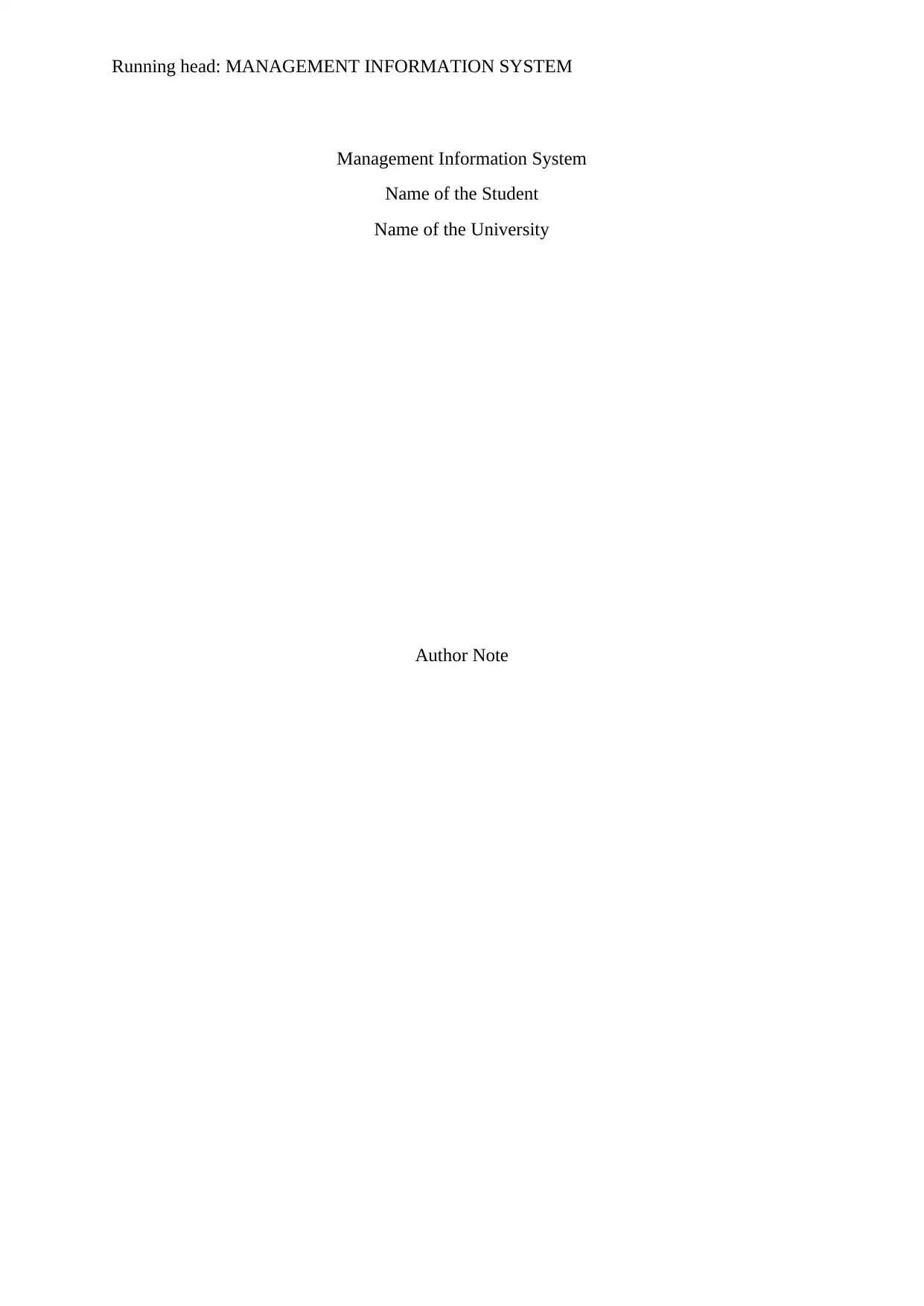
Running head: MANAGEMENT INFORMATION SYSTEM
Management Information System
Name of the Student
Name of the University
Author Note
Management Information System
Name of the Student
Name of the University
Author Note
Paraphrase This Document
Need a fresh take? Get an instant paraphrase of this document with our AI Paraphraser
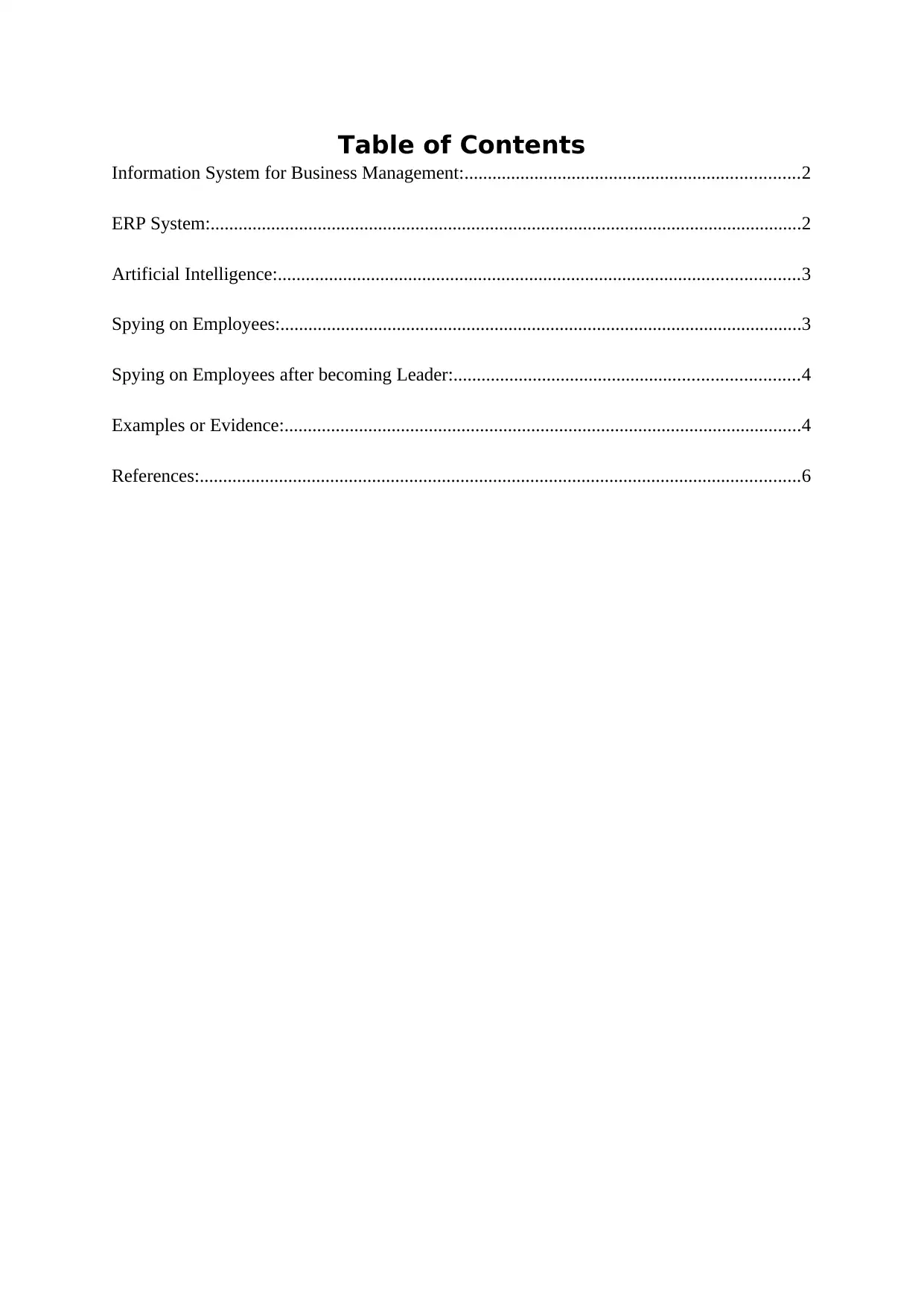
Table of Contents
Information System for Business Management:........................................................................2
ERP System:...............................................................................................................................2
Artificial Intelligence:................................................................................................................3
Spying on Employees:................................................................................................................3
Spying on Employees after becoming Leader:..........................................................................4
Examples or Evidence:...............................................................................................................4
References:.................................................................................................................................6
Information System for Business Management:........................................................................2
ERP System:...............................................................................................................................2
Artificial Intelligence:................................................................................................................3
Spying on Employees:................................................................................................................3
Spying on Employees after becoming Leader:..........................................................................4
Examples or Evidence:...............................................................................................................4
References:.................................................................................................................................6
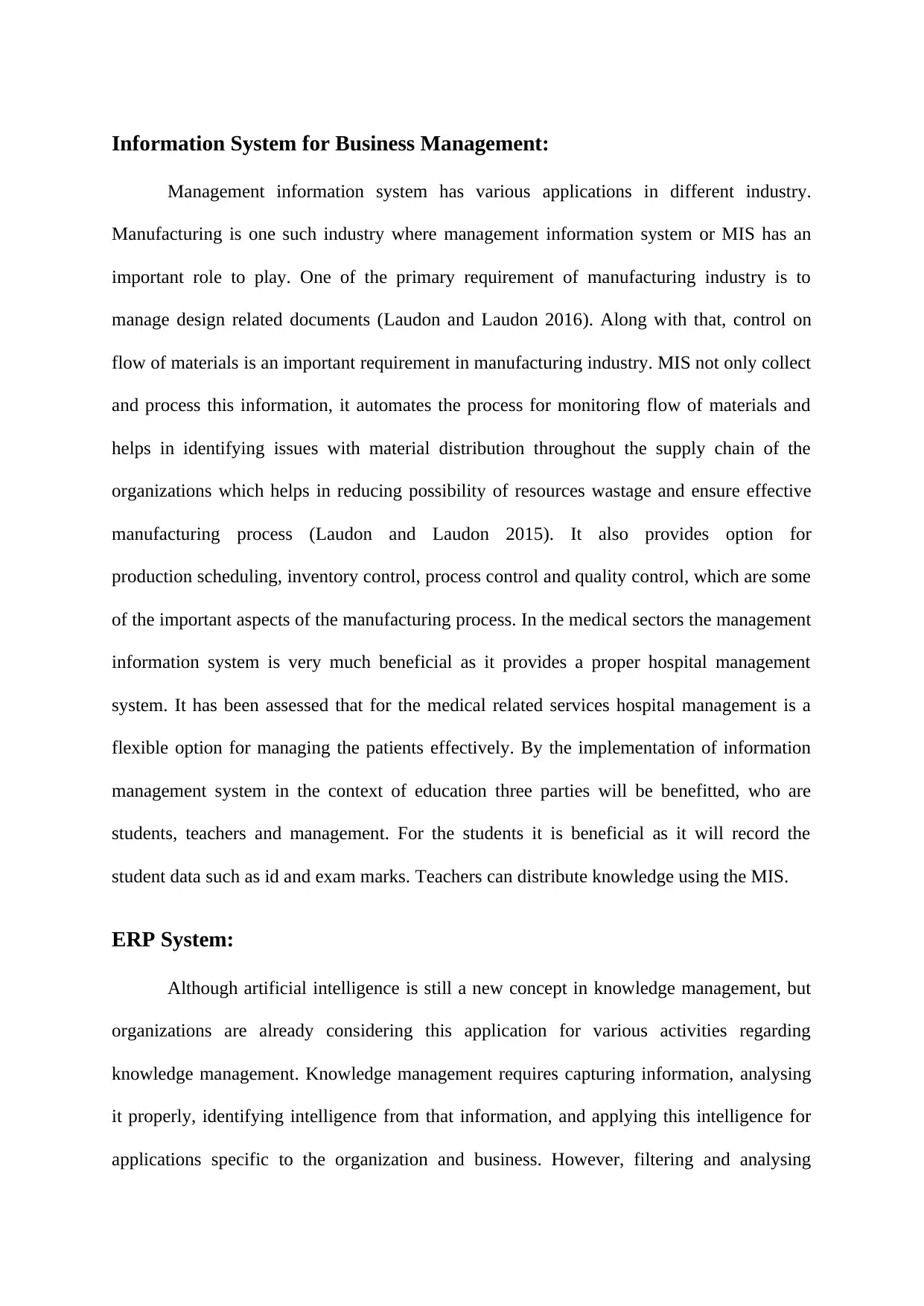
Information System for Business Management:
Management information system has various applications in different industry.
Manufacturing is one such industry where management information system or MIS has an
important role to play. One of the primary requirement of manufacturing industry is to
manage design related documents (Laudon and Laudon 2016). Along with that, control on
flow of materials is an important requirement in manufacturing industry. MIS not only collect
and process this information, it automates the process for monitoring flow of materials and
helps in identifying issues with material distribution throughout the supply chain of the
organizations which helps in reducing possibility of resources wastage and ensure effective
manufacturing process (Laudon and Laudon 2015). It also provides option for
production scheduling, inventory control, process control and quality control, which are some
of the important aspects of the manufacturing process. In the medical sectors the management
information system is very much beneficial as it provides a proper hospital management
system. It has been assessed that for the medical related services hospital management is a
flexible option for managing the patients effectively. By the implementation of information
management system in the context of education three parties will be benefitted, who are
students, teachers and management. For the students it is beneficial as it will record the
student data such as id and exam marks. Teachers can distribute knowledge using the MIS.
ERP System:
Although artificial intelligence is still a new concept in knowledge management, but
organizations are already considering this application for various activities regarding
knowledge management. Knowledge management requires capturing information, analysing
it properly, identifying intelligence from that information, and applying this intelligence for
applications specific to the organization and business. However, filtering and analysing
Management information system has various applications in different industry.
Manufacturing is one such industry where management information system or MIS has an
important role to play. One of the primary requirement of manufacturing industry is to
manage design related documents (Laudon and Laudon 2016). Along with that, control on
flow of materials is an important requirement in manufacturing industry. MIS not only collect
and process this information, it automates the process for monitoring flow of materials and
helps in identifying issues with material distribution throughout the supply chain of the
organizations which helps in reducing possibility of resources wastage and ensure effective
manufacturing process (Laudon and Laudon 2015). It also provides option for
production scheduling, inventory control, process control and quality control, which are some
of the important aspects of the manufacturing process. In the medical sectors the management
information system is very much beneficial as it provides a proper hospital management
system. It has been assessed that for the medical related services hospital management is a
flexible option for managing the patients effectively. By the implementation of information
management system in the context of education three parties will be benefitted, who are
students, teachers and management. For the students it is beneficial as it will record the
student data such as id and exam marks. Teachers can distribute knowledge using the MIS.
ERP System:
Although artificial intelligence is still a new concept in knowledge management, but
organizations are already considering this application for various activities regarding
knowledge management. Knowledge management requires capturing information, analysing
it properly, identifying intelligence from that information, and applying this intelligence for
applications specific to the organization and business. However, filtering and analysing
⊘ This is a preview!⊘
Do you want full access?
Subscribe today to unlock all pages.

Trusted by 1+ million students worldwide
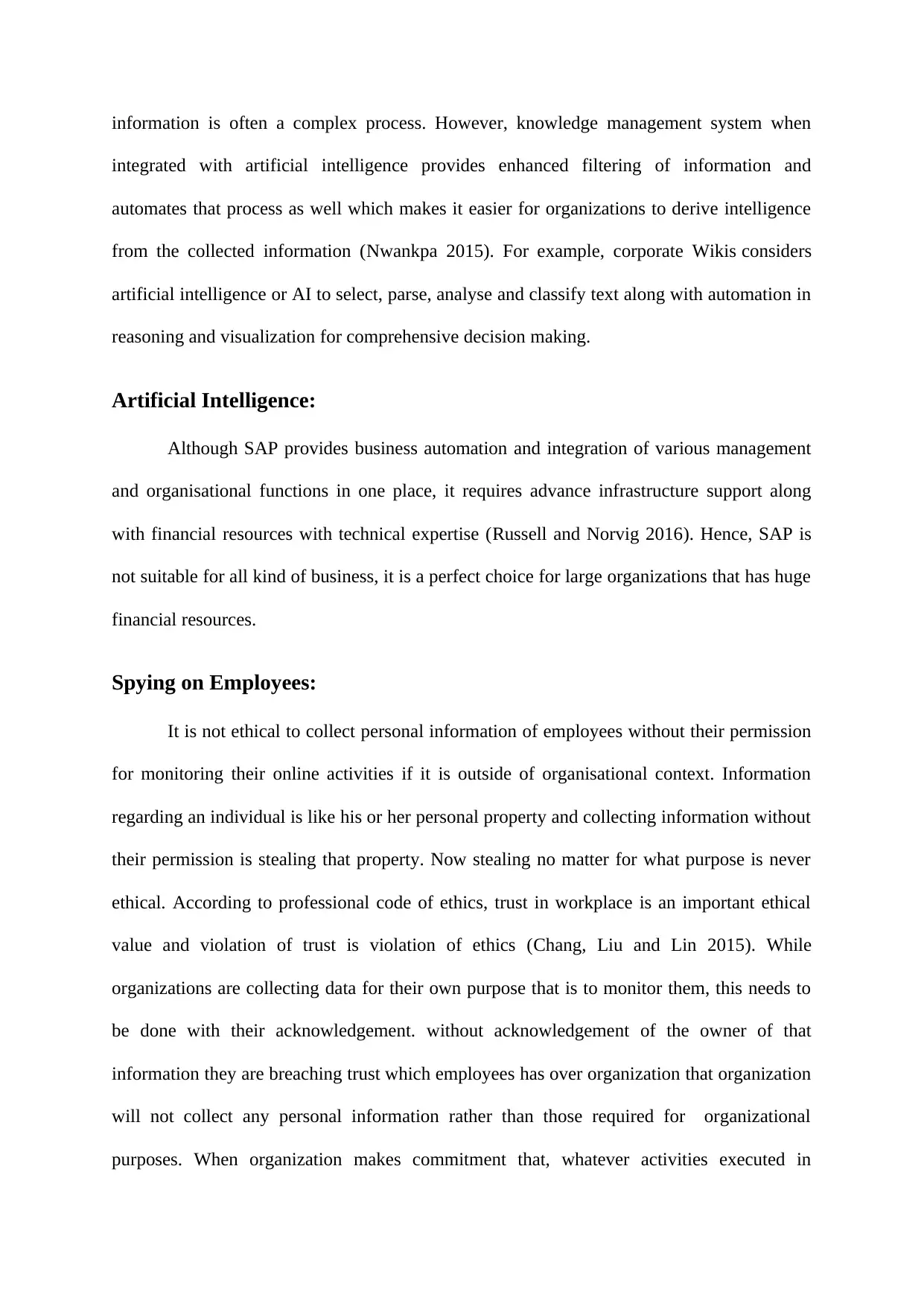
information is often a complex process. However, knowledge management system when
integrated with artificial intelligence provides enhanced filtering of information and
automates that process as well which makes it easier for organizations to derive intelligence
from the collected information (Nwankpa 2015). For example, corporate Wikis considers
artificial intelligence or AI to select, parse, analyse and classify text along with automation in
reasoning and visualization for comprehensive decision making.
Artificial Intelligence:
Although SAP provides business automation and integration of various management
and organisational functions in one place, it requires advance infrastructure support along
with financial resources with technical expertise (Russell and Norvig 2016). Hence, SAP is
not suitable for all kind of business, it is a perfect choice for large organizations that has huge
financial resources.
Spying on Employees:
It is not ethical to collect personal information of employees without their permission
for monitoring their online activities if it is outside of organisational context. Information
regarding an individual is like his or her personal property and collecting information without
their permission is stealing that property. Now stealing no matter for what purpose is never
ethical. According to professional code of ethics, trust in workplace is an important ethical
value and violation of trust is violation of ethics (Chang, Liu and Lin 2015). While
organizations are collecting data for their own purpose that is to monitor them, this needs to
be done with their acknowledgement. without acknowledgement of the owner of that
information they are breaching trust which employees has over organization that organization
will not collect any personal information rather than those required for organizational
purposes. When organization makes commitment that, whatever activities executed in
integrated with artificial intelligence provides enhanced filtering of information and
automates that process as well which makes it easier for organizations to derive intelligence
from the collected information (Nwankpa 2015). For example, corporate Wikis considers
artificial intelligence or AI to select, parse, analyse and classify text along with automation in
reasoning and visualization for comprehensive decision making.
Artificial Intelligence:
Although SAP provides business automation and integration of various management
and organisational functions in one place, it requires advance infrastructure support along
with financial resources with technical expertise (Russell and Norvig 2016). Hence, SAP is
not suitable for all kind of business, it is a perfect choice for large organizations that has huge
financial resources.
Spying on Employees:
It is not ethical to collect personal information of employees without their permission
for monitoring their online activities if it is outside of organisational context. Information
regarding an individual is like his or her personal property and collecting information without
their permission is stealing that property. Now stealing no matter for what purpose is never
ethical. According to professional code of ethics, trust in workplace is an important ethical
value and violation of trust is violation of ethics (Chang, Liu and Lin 2015). While
organizations are collecting data for their own purpose that is to monitor them, this needs to
be done with their acknowledgement. without acknowledgement of the owner of that
information they are breaching trust which employees has over organization that organization
will not collect any personal information rather than those required for organizational
purposes. When organization makes commitment that, whatever activities executed in
Paraphrase This Document
Need a fresh take? Get an instant paraphrase of this document with our AI Paraphraser
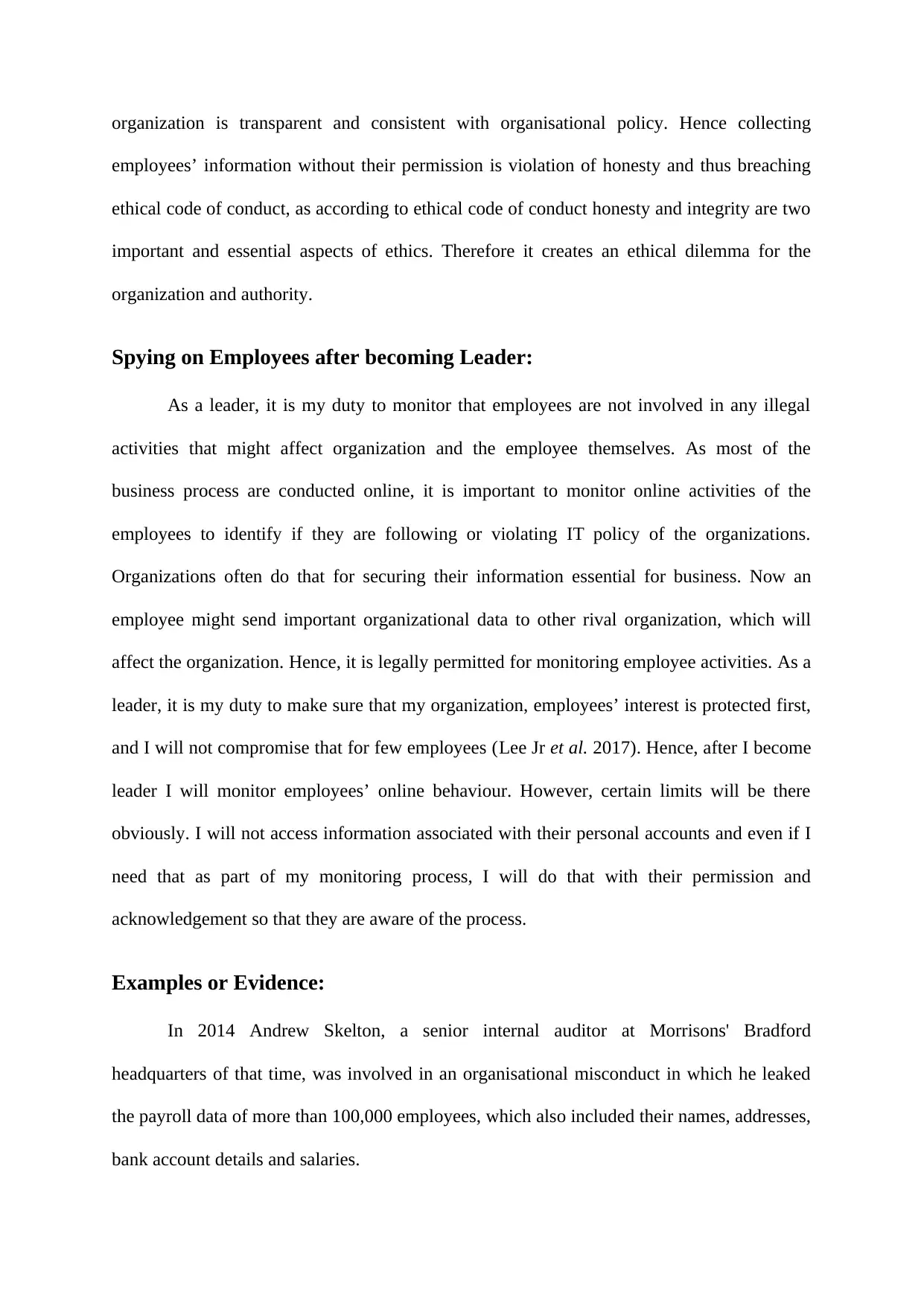
organization is transparent and consistent with organisational policy. Hence collecting
employees’ information without their permission is violation of honesty and thus breaching
ethical code of conduct, as according to ethical code of conduct honesty and integrity are two
important and essential aspects of ethics. Therefore it creates an ethical dilemma for the
organization and authority.
Spying on Employees after becoming Leader:
As a leader, it is my duty to monitor that employees are not involved in any illegal
activities that might affect organization and the employee themselves. As most of the
business process are conducted online, it is important to monitor online activities of the
employees to identify if they are following or violating IT policy of the organizations.
Organizations often do that for securing their information essential for business. Now an
employee might send important organizational data to other rival organization, which will
affect the organization. Hence, it is legally permitted for monitoring employee activities. As a
leader, it is my duty to make sure that my organization, employees’ interest is protected first,
and I will not compromise that for few employees (Lee Jr et al. 2017). Hence, after I become
leader I will monitor employees’ online behaviour. However, certain limits will be there
obviously. I will not access information associated with their personal accounts and even if I
need that as part of my monitoring process, I will do that with their permission and
acknowledgement so that they are aware of the process.
Examples or Evidence:
In 2014 Andrew Skelton, a senior internal auditor at Morrisons' Bradford
headquarters of that time, was involved in an organisational misconduct in which he leaked
the payroll data of more than 100,000 employees, which also included their names, addresses,
bank account details and salaries.
employees’ information without their permission is violation of honesty and thus breaching
ethical code of conduct, as according to ethical code of conduct honesty and integrity are two
important and essential aspects of ethics. Therefore it creates an ethical dilemma for the
organization and authority.
Spying on Employees after becoming Leader:
As a leader, it is my duty to monitor that employees are not involved in any illegal
activities that might affect organization and the employee themselves. As most of the
business process are conducted online, it is important to monitor online activities of the
employees to identify if they are following or violating IT policy of the organizations.
Organizations often do that for securing their information essential for business. Now an
employee might send important organizational data to other rival organization, which will
affect the organization. Hence, it is legally permitted for monitoring employee activities. As a
leader, it is my duty to make sure that my organization, employees’ interest is protected first,
and I will not compromise that for few employees (Lee Jr et al. 2017). Hence, after I become
leader I will monitor employees’ online behaviour. However, certain limits will be there
obviously. I will not access information associated with their personal accounts and even if I
need that as part of my monitoring process, I will do that with their permission and
acknowledgement so that they are aware of the process.
Examples or Evidence:
In 2014 Andrew Skelton, a senior internal auditor at Morrisons' Bradford
headquarters of that time, was involved in an organisational misconduct in which he leaked
the payroll data of more than 100,000 employees, which also included their names, addresses,
bank account details and salaries.
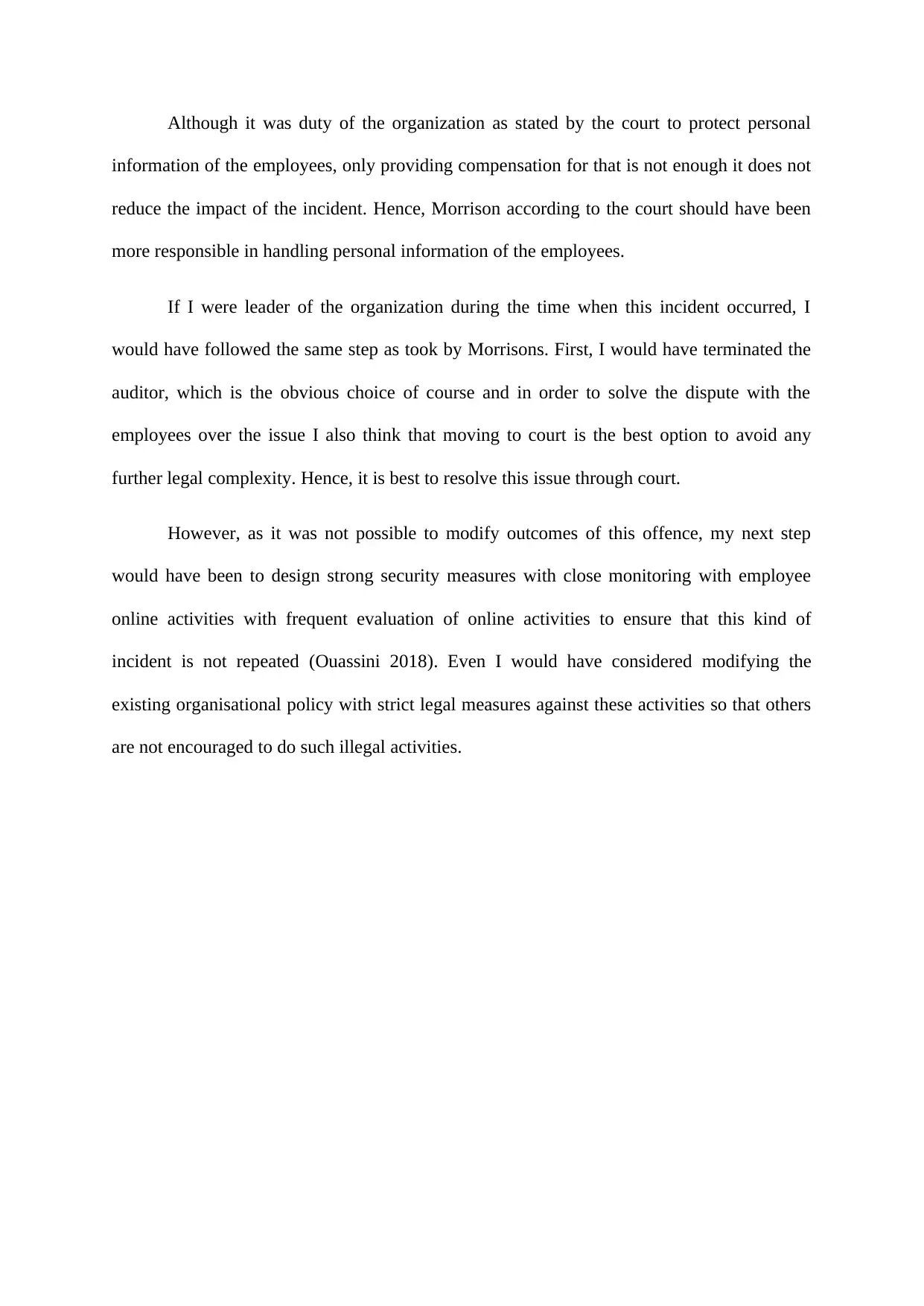
Although it was duty of the organization as stated by the court to protect personal
information of the employees, only providing compensation for that is not enough it does not
reduce the impact of the incident. Hence, Morrison according to the court should have been
more responsible in handling personal information of the employees.
If I were leader of the organization during the time when this incident occurred, I
would have followed the same step as took by Morrisons. First, I would have terminated the
auditor, which is the obvious choice of course and in order to solve the dispute with the
employees over the issue I also think that moving to court is the best option to avoid any
further legal complexity. Hence, it is best to resolve this issue through court.
However, as it was not possible to modify outcomes of this offence, my next step
would have been to design strong security measures with close monitoring with employee
online activities with frequent evaluation of online activities to ensure that this kind of
incident is not repeated (Ouassini 2018). Even I would have considered modifying the
existing organisational policy with strict legal measures against these activities so that others
are not encouraged to do such illegal activities.
information of the employees, only providing compensation for that is not enough it does not
reduce the impact of the incident. Hence, Morrison according to the court should have been
more responsible in handling personal information of the employees.
If I were leader of the organization during the time when this incident occurred, I
would have followed the same step as took by Morrisons. First, I would have terminated the
auditor, which is the obvious choice of course and in order to solve the dispute with the
employees over the issue I also think that moving to court is the best option to avoid any
further legal complexity. Hence, it is best to resolve this issue through court.
However, as it was not possible to modify outcomes of this offence, my next step
would have been to design strong security measures with close monitoring with employee
online activities with frequent evaluation of online activities to ensure that this kind of
incident is not repeated (Ouassini 2018). Even I would have considered modifying the
existing organisational policy with strict legal measures against these activities so that others
are not encouraged to do such illegal activities.
⊘ This is a preview!⊘
Do you want full access?
Subscribe today to unlock all pages.

Trusted by 1+ million students worldwide
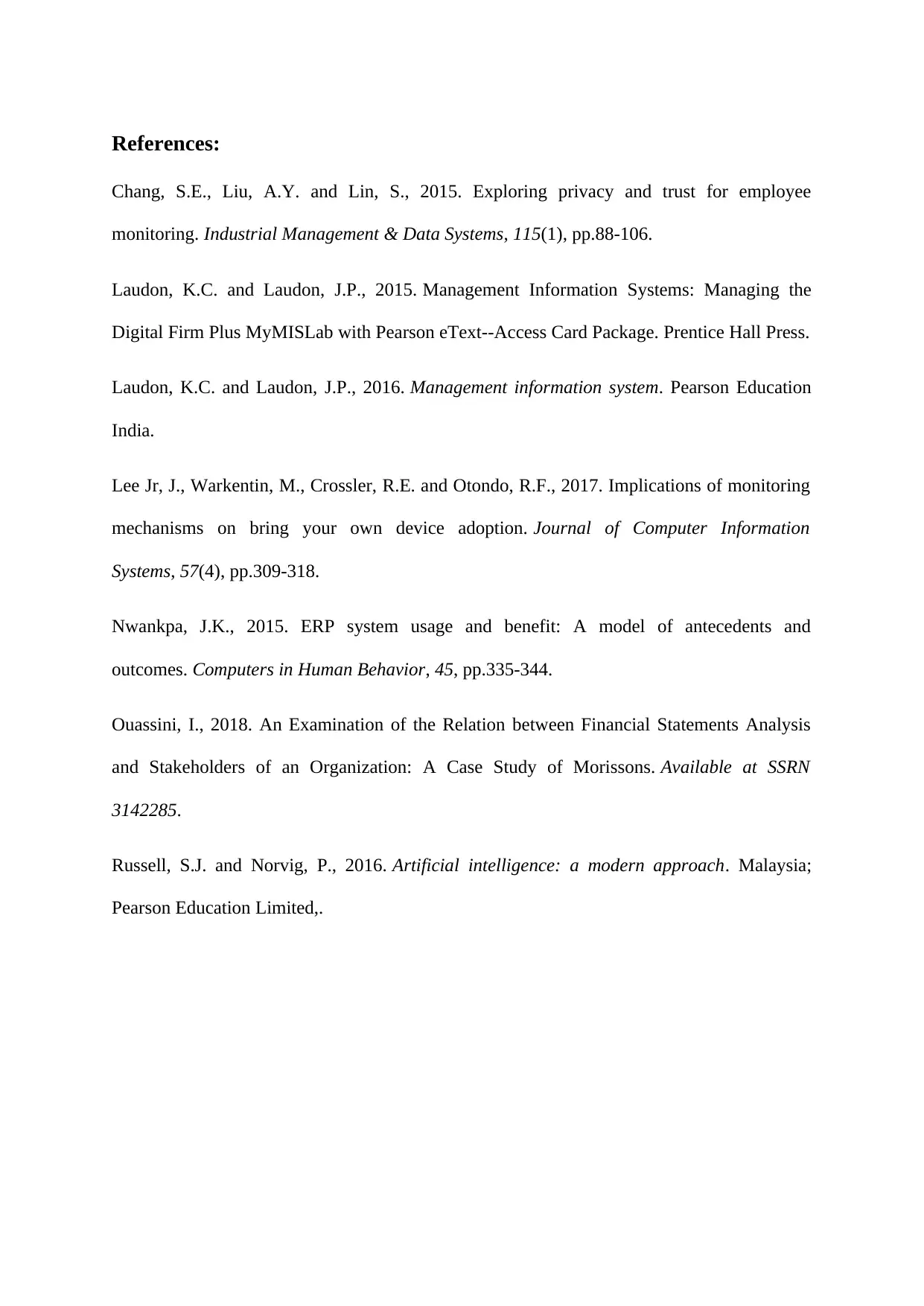
References:
Chang, S.E., Liu, A.Y. and Lin, S., 2015. Exploring privacy and trust for employee
monitoring. Industrial Management & Data Systems, 115(1), pp.88-106.
Laudon, K.C. and Laudon, J.P., 2015. Management Information Systems: Managing the
Digital Firm Plus MyMISLab with Pearson eText--Access Card Package. Prentice Hall Press.
Laudon, K.C. and Laudon, J.P., 2016. Management information system. Pearson Education
India.
Lee Jr, J., Warkentin, M., Crossler, R.E. and Otondo, R.F., 2017. Implications of monitoring
mechanisms on bring your own device adoption. Journal of Computer Information
Systems, 57(4), pp.309-318.
Nwankpa, J.K., 2015. ERP system usage and benefit: A model of antecedents and
outcomes. Computers in Human Behavior, 45, pp.335-344.
Ouassini, I., 2018. An Examination of the Relation between Financial Statements Analysis
and Stakeholders of an Organization: A Case Study of Morissons. Available at SSRN
3142285.
Russell, S.J. and Norvig, P., 2016. Artificial intelligence: a modern approach. Malaysia;
Pearson Education Limited,.
Chang, S.E., Liu, A.Y. and Lin, S., 2015. Exploring privacy and trust for employee
monitoring. Industrial Management & Data Systems, 115(1), pp.88-106.
Laudon, K.C. and Laudon, J.P., 2015. Management Information Systems: Managing the
Digital Firm Plus MyMISLab with Pearson eText--Access Card Package. Prentice Hall Press.
Laudon, K.C. and Laudon, J.P., 2016. Management information system. Pearson Education
India.
Lee Jr, J., Warkentin, M., Crossler, R.E. and Otondo, R.F., 2017. Implications of monitoring
mechanisms on bring your own device adoption. Journal of Computer Information
Systems, 57(4), pp.309-318.
Nwankpa, J.K., 2015. ERP system usage and benefit: A model of antecedents and
outcomes. Computers in Human Behavior, 45, pp.335-344.
Ouassini, I., 2018. An Examination of the Relation between Financial Statements Analysis
and Stakeholders of an Organization: A Case Study of Morissons. Available at SSRN
3142285.
Russell, S.J. and Norvig, P., 2016. Artificial intelligence: a modern approach. Malaysia;
Pearson Education Limited,.
1 out of 7
Related Documents
Your All-in-One AI-Powered Toolkit for Academic Success.
+13062052269
info@desklib.com
Available 24*7 on WhatsApp / Email
![[object Object]](/_next/static/media/star-bottom.7253800d.svg)
Unlock your academic potential
Copyright © 2020–2026 A2Z Services. All Rights Reserved. Developed and managed by ZUCOL.





